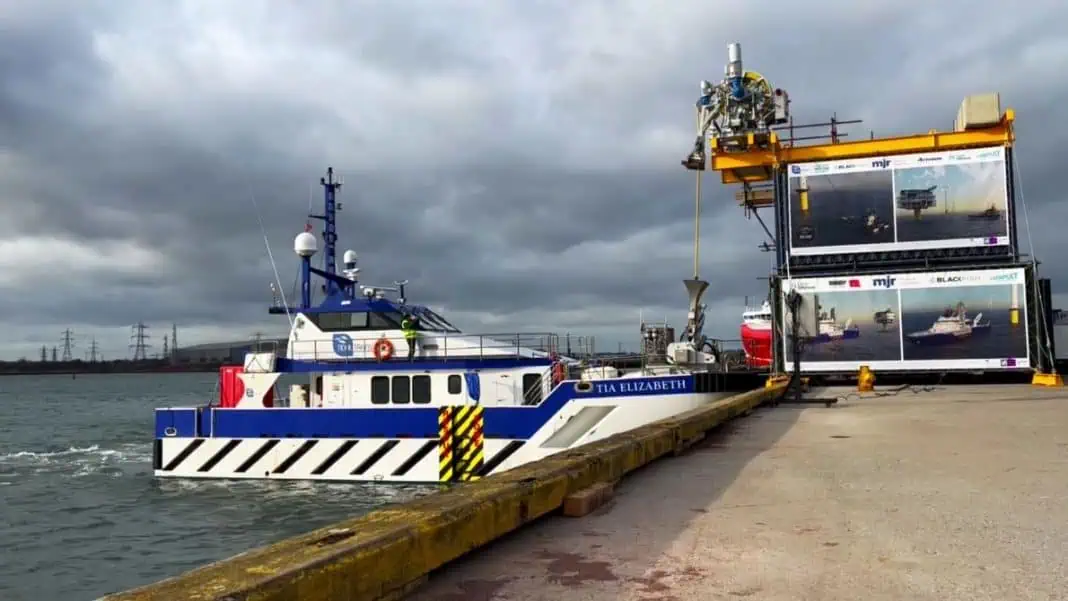The UK’s leading marine electrical engineering company – MJR Power and Automation, together with their project partners Blackfish Engineering and Tidal Transit – announce announces the successful harbour trials of its platform mounted automated offshore power and charging system, set to revolutionise the marine sector by enabling the transition to heavy hybrid and fully electric vessels for zero emission operations.
The harbour trials have been successfully carried out at the Port of Blyth – the UK’s premier offshore wind energy support base – using the TIA Elizabeth Crew Transfer Vessel (CTV) owned and operated by Tidal Transit. The set-up at the port replicated the installation of the offshore power and charging system on an offshore wind turbine and/or substation validating the safe connection, mooring, and charging of battery bank installed on the CTV. With safety embedded throughout the system, all interconnection, mooring, automation, monitoring, and safety systems, including wireless communication and emergency disconnection were vigorously tested and validated during the trails.
Designed to convert energy delivered directly from the offshore wind farm , the offshore power and charging system will enable all heavy hybrid and electric crew transfer vessels and other offshore support vessels to connect in the field to a 100% green energy source generated directly by offshore wind turbines for the efficient, safe and reliable transfer of power.
It will also enable offshore power to be supplied to other support vessels allowing them to turn off their diesel generators whilst standing by, in the same way that they can connect to shore power.
Speaking about the successful trial, Paul Cairns, Managing Director at MJR said: “Our offshore power and charging system is a ground-breaking innovation set to revolutionise the marine sector and which has huge potential to enable the industry to seamlessly transition to electrically operated CTV fleets.
“By providing a solution to power vessels and charge batteries in the field – primarily during periods when they would otherwise be idle – MJR’s offshore power and charging system will prove to be a key enabler for the large-scale deployment of eCTVs and larger electric hybrid vessels across the offshore sector.
“Put simply, if 50% of the UK’s CTV fleet converted to electric operation, this would eliminate approximately 131,100 tonnes of CO2 each year. These figures are staggering and highlight that such technology, and the adoption of it, will be pivotal in reducing emissions in the field and helping owners, operators and governments to achieve their net zero targets.”
“Also, without the funding support of the UK’s department for transport and delivery partner, Innovate UK, through the Clean Maritime Demonstration Competition, we would not be leading the world in delivering this innovative technology and we are extremely grateful for their ongoing support and vision in delivering clean maritime technologies”.
With successful harbour trials now complete, MJR will now demobilise the equipment and prepare for installation on an operational offshore wind farm substation in the North Sea.
In addition to charging CTVs, with a maximum charging time of two hours, MJR are also developing a similar system for delivering higher powers for providing offshore power and charging for larger vessels, including Service Operations Vessels (SOVs).
With over 25 years’ experience delivering marine electrical power and automation projects from new build, retrofit and upgrade, MJR Power & Automation is at the very forefront of providing innovative solutions – both at port and offshore – to support the decarbonisation of the maritime sector. The company provides a complete turnkey offering of products and solutions ranging from vessel power generation and propulsion, automation & control, to energy storage systems, and shore power supplies.
Link to the video of the trials: Video of Harbour Trials.












